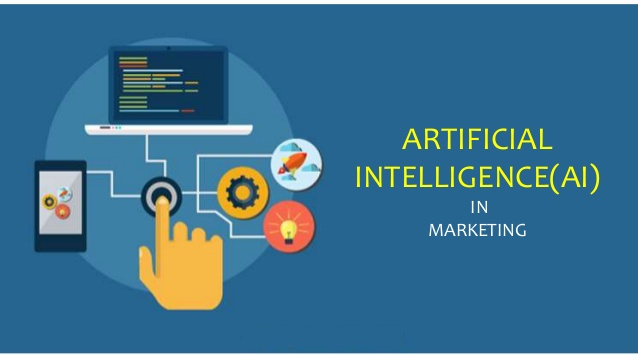Artificial Intelligence in Marketing Smart Strategies of the Research and Development Process
Artificial
intelligence in marketing helps the marketers to leverage customer's data to
draw important insights like buying behavior of the customer. Artificial
Intelligence in marketing makes use of various concepts like machine learning
to know the pattern of the consumer which helps the companies to plan their
next move accordingly. Artificial Intelligence in marketing is used in various
applications such as dynamic pricing, social media advertising, and sales &
marketing automation among others.
The global Artificialintelligence in marketing market is experiencing high demand due to the
increasing popularity of social media. Various sectors like BFSI, retail, and
consumer goods are using these solutions to gain more revenues. The growing use
of social media and the growing popularity of customer-centric marketing
strategies are the major factors that are expected to support the growth of
artificial intelligence in marketing market whereas data privacy issues are the
major factors that are expected to slow down the growth of this market.
What is Artificial Intelligence Marketing?
The evolution of big
data and advanced analytic solutions have made it possible for marketers to
build a clearer picture of their target audiences than ever before; and in this
hotbed of advancement lies artificial intelligence (AI) marketing.
Artificial
Intelligence enables marketers to create highly personalized consumer
experiences that cost significantly less than traditional high-dollar
campaigns.
The artificial intelligence (AI) in marketing
market was valued at USD 5.00 Billion in 2017 and is likely to reach USD 40.09
Billion by 2025, at a CAGR of 29.79% during the forecast period.
Get sample PDF copy at: https://www.theinsightpartners.com/sample/TIPRE00002954/
The report aims to
provide an overview of the global artificial intelligence in marketing market
with detailed market segmentation by offering, technology, deployment type,
application, industry, and geography. The global artificial intelligence in
marketing market is expected to witness high growth during the forecast period.
The report provides key statistics on the market status of the leading market
players and offers key trends and opportunities in the artificial intelligence
in marketing market.
Ways Artificial Intelligence Can Be Used in Marketing
Artificial
Intelligence enables marketers to create highly personalized consumer
experiences that cost significantly less than traditional high-dollar
campaigns.
1. Take Sales Forecasting to the Next Level
AI takes conversion
management solutions to the next level. Marketers can now compare sophisticated
inbound communication side-by-side against traditional metrics to help answer
difficult strategy questions. With AI marketing, there are no longer questions
about whether or not a prospect is ready for a discussion, the data provides the
answer.
2. Gain a Deeper Understanding of Your
Consumers
With AI solutions,
marketers know exactly what consumers are thinking, saying, and feeling about
the brand in real time. Similarly, with the onslaught of social media available
(and the AI to analyze it), marketers can truly understand what customers are
feeling. Savvy marketers can harness this data in real-time and then quickly
modify messaging or branding for maximum effectiveness.
3. Optimize Digital Advertising Campaigns
While there are various
ways to optimize digital advertising and account-based marketing, AI solutions
help marketers take them a step further for deeper insight and analysis. AI can
tap into the abundance of consumer data hidden in keyword searches, social
profiles, and other online data, for smarter and more effective digital ads.
The results are human-level outcomes and insights without the manual human
labor.
4. Create Detailed Consumer Profiles
5. Join Real-Time Conversations with Consumers
One of the advanced
capabilities of AI is its ability to analyze large blocks of open content and
identify trends. This allows brands to interact directly with consumers in real
time through online conversations or events. Communicating with consumers at
the precise ‘decision-making moment’ can help directly influence buying
decisions. AI helps marketers monitor these social conversations and other open
forums to identify any relevant conversations.
Software to hold largest share of AI in
marketing market by 2025
AI systems require
different types of software, including application program interfaces, such as
language, speech, vision, and sensor data, along with machine learning
algorithms, to realize various applications for sales and marketing. Software
platforms and solutions are available at high costs as there are limited number
of experts that develop machine learning algorithms.
Market for cloud deployment to grow at higher
CAGR between 2018 and 2025
Migrating to the
cloud has benefits such as enhanced flexibility, control, and scalability.
Cloud deployment significantly reduces the capital investment required to
implement AI-based solutions for marketing and sales; this is one of the major
reasons for the increased demand for cloud-based solutions from most
enterprises.
The report also
focuses on leading industry players with information such as company profiles,
products, and services offered, financial information for the last 3 years, a
key development in the past five years. Some of the key players influencing the
artificial intelligence in marketing market are Amazon, Inc., Albert
Technologies Ltd., Facebook, Inc., IBM Corporation, Intel Corporation,
Microsoft Corporation, Narrative Science, Samsung Electronics, Sentient
Technologies, and Xilinx
Buy this report research at: https://www.theinsightpartners.com/buy/TIPRE00002954/



In the enterprise market, companies want to have a way to analyze the data captured by their IoT devices, and to determine the best ways to use the devices to improve their business. This is where anIot analytics platformcomes into play. The platform is used to analyze the data captured by the devices, and to use the data to make business decisions.
ReplyDelete